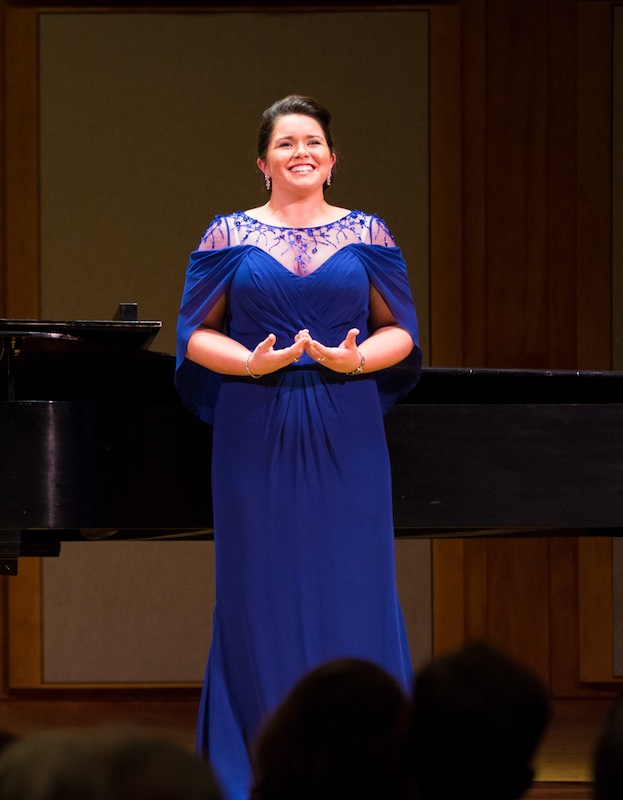Irish mezzo shows charm and artistry in Boston debut

Tara Erraught performed a recital Wednesday night at Pickman Hall for the Celebrity Series. Photo: Robert Torres
Four years ago, Tara Erraught stepped into the role of Romeo in a performance of Bellini’s I Capuleti e i Montecchi with the Bavarian State Opera with only five days’ notice. Her singing and acting won over audiences and critics, and her career, which has gone on to include a number of demanding roles as well as the premiere of new works, has been on the ascent ever since.
The Irish-born mezzo-soprano made her Boston debut Wednesday night at Pickman Hall with a touching program of art song, presented by the Celebrity Series.
Recital programs, especially when performed by opera singers, unfold as a series of miniature dramas. Erraught proved a stellar actress in conveying the imagery of the songs she sang. Her eyes were particularly expressive, and she punctuated her phrases with subtle hand gestures.
Erraught possesses a warm, vibrant voice that flowers handsomely in the upper register. Low notes take on a plush quality, and she sings with a ripe, gently spinning vibrato that gives her lines a palpable weight. Her voice is also colorful, and she shaded the music with slight changes in tone and dynamics without losing intensity.
Her artistry was most apparent in songs by Brahms and Strauss.
The singer effectively captured the dialogue between boy and girl in Brahms’ “Vergebliches Ständchen,” the joyful exuberance of “Juchhe!”, and the anger and intensity of the maiden’s curse to “Mädchenfluch”. Her rendering of “Die Mainacht” was soft and supple, the music’s moonlit lines seeming to glow from a distance.
The music of Richard Strauss is a favorite of Erraught’s. She is no stranger to the composer’s large-scale works, known for her Octavian in Der Rosenkavalier.
With rosy voice and crystalline diction, Erraught sang Strauss’ “Allerseelen” to create sounds of a quiet radiance. Her upper range rang even in the softest passages of “Die Nacht,” while “Morgen!” sounded with prayerful tranquility.
Erraught’s program brought attention to lesser known repertoire as well, which included songs by Liszt, Delius, and Roger Quilter.
Liszt’s songs aren’t as well known as his piano works, and it’s hard to see why given their colorful melodies and evocative text painting.
With radiant tone, Erraught captured the whimsical and storm-tossed textures of “Enfant, si j’étais roi.” “Die Lorelei” was dark, yet managed to shimmer on the high notes. She found the playful and light sonorities of “Was Liebe sei” and the blissful reverie of “Jugendglück.”
Erraught had an equal and sensitive partner in pianist Henning Ruhe. With a tone that was resonant and deep, even with the lid propped on the small peg, he found the stormy textures of the Liszt songs, the twinkling cascades of the Brahms, and the haunting mystery of the Strauss. In Brahms’ “Wie Melodien zieht es mir,” the pianist wove his accompaniment with Erraught’s melodies into soft fabric of sound. His playing of the rolling figures in “Mädchenfluch” sounded as distant thunder.
The songs by Delius and Quilter provided the richest musical rewards. The opening chords of Delius’ “Twilight fancies” sounded poetic under Ruhe’s feathery touch, with Erraught answering with beautiful arching lines. The singer captured the pastoral balladry of the Quilter songs, with the dreamy soundscapes of “Now sleeps the crimson petal” lingering most in the memory.
Warm applause brought Erraught and Ruhe back onstage for two encores. The first, “Non v’e donna sulla terra” from Michael William Balfe’s opera Falstaff, gave the singer a chance to show off her ample bel canto style. The second, a tender and hushed “Danny Boy,” sent listeners whistling into the night.
The next concert of the Celebrity Series will feature the Takács Quartet in music by Haydn, Dvorák, and Andres 8 p.m. Friday at Jordan Hall. celebrityseries.org; 617-482-6661.
Posted in Performances